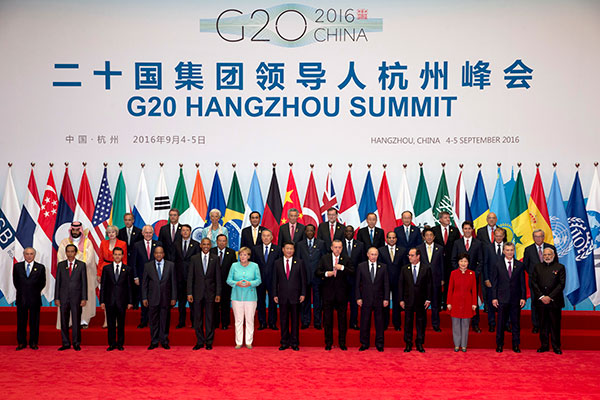 时刻新闻
时刻新闻

|
|
Leaders pose for pictures during the G20 Leaders Summit at the Hangzhou International Expo Center in Hangzhou, East China's Zhejiang province, on Sunday. WU ZHIYI/CHINA DAILY |
President tells world leaders China will strive to boost growth, aid development
President Xi Jinping urged the leaders of the world's biggest economies to deliver "real action" and "no empty talk" as they attempt to steer the global economy out of its sluggish state.
In his opening speech at the start of the two-day G20 Summit on Sunday, he said the G20 had drawn up action plans in multiple fields, including sustainable development, green finance, energy efficiency and anti-corruption, "and we should implement each of them seriously".
The Hangzhou summit has come at a time when the world economy is plagued by problems, short and long term, such as poor growth momentum, changing demographics, rising trade protectionism and low investment, Xi said.
But he insisted that G20 members will "face the problems squarely" and collaborate in developing solutions.
World leaders vowed at the meeting to find workable solutions to restore strong growth and achieve more-inclusive development that reduces inequality. They also agreed that more focus should be placed on structural reforms, innovation and high-technology, as traditional growth engines have weakened.
German Chancellor Angela Merkel said leaders had agreed that they must work together to boost global economic growth, and she welcomed China's focus on structural reform.
She added that digital ministers from the world's biggest economies will meet for the first time next year and that the group planned to set up a task force for innovation, Reuters reported.
Xi said in his speech that while the world needs to better coordinate monetary and fiscal policies and carry out structural reforms, priority should be given to achieving balanced growth. He said the G20 will help less-developed countries, including those in Africa, with industrialization as well as green energy and finance to bridge the gaps in global development.
The G20 has been criticized in the past for failing to take concrete measures to coordinate world economies. While urging members to take substantial action, Xi said the group "should continue to build our mechanisms to ensure our cooperation continues and deepens".
"The G20 is becoming more systematic and is changing from a short-term arrangement to handle crises to a long-term dialogue and action mechanism," according to Chen Wenling, chief economist at the China Center for International Economic Exchanges. "To make it more effective, the G20 should establish a secretariat."
Wang Wen, acting director of Renmin University of China's Chongyang Institute for Financial Studies, added: "The G20 used to be driven by crises, and now it's driven by ideas. China has provided a global consensus at the Hangzhou summit that will drive global joint action."



